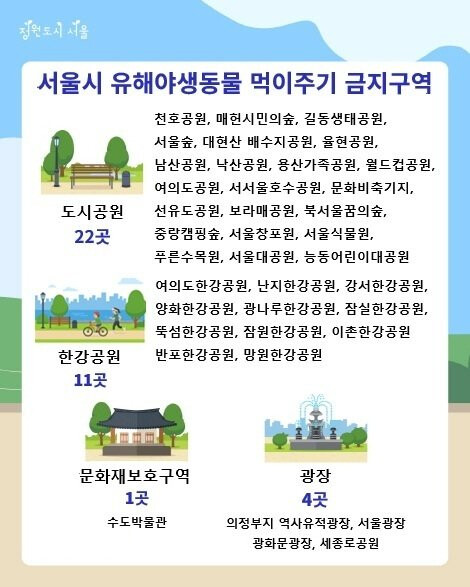
Seoul, South Korea – Beginning July 1, 2025, the act of feeding pigeons in prominent public areas across Seoul will become a fineable offense. This proactive step by the Seoul Metropolitan Government, which designated 38 "prohibited feeding zones" for harmful wild animals in April, reflects a growing global trend to manage urban wildlife populations more effectively and reduce associated public health and infrastructure concerns.
The crackdown comes amidst escalating complaints about pigeon-related damage. According to city officials, the number of pigeon-related grievances in Seoul surged from 430 in 2018 to 1,480 last year. These complaints range from the corrosive effects of pigeon droppings on buildings, cultural heritage sites, and bridges to concerns about disease transmission in high-traffic areas and unhygienic conditions caused by flying feathers.
The Rationale Behind the Ban: Restoring Ecological Balance
While commonly perceived as docile urban inhabitants, pigeons are, in fact, wild animals. Their burgeoning populations in cities are largely attributed to the easy availability of food scraps and human-provided sustenance. This readily accessible food supply has led to an unnatural population boom and a behavioral adaptation that has detached them from their natural foraging instincts.
"The core intent of this policy is not to eradicate pigeons, but rather to stabilize their population at an ecologically manageable level," explained a Seoul city official. "We aim to explore a harmonious coexistence between humans and pigeons."
The city emphasizes that the ban is a crucial step towards restoring the urban ecosystem. By limiting indiscriminate feeding, Seoul hopes to encourage pigeons to revert to more natural foraging behaviors, which in turn should help regulate their numbers. This "positive distancing," as a city official put it, is seen as the beginning of a healthier integration of pigeons into the urban environment.
Penalties and Precedents: Following International Examples
Violators of the new feeding ban will face escalating fines: a first offense will incur a penalty of ₩200,000 (approximately $145 USD), a second offense ₩500,000 (approximately $365 USD), and a third or subsequent offense ₩1,000,000 (approximately $730 USD).
Seoul is not alone in implementing such measures. Numerous cities worldwide have already taken similar action. Singapore, for instance, has long enforced strict rules against feeding pigeons, citing public health and cleanliness concerns. London, UK, has also implemented feeding bans in various public squares and parks, with wardens actively enforcing the rules. Similarly, Paris, France, has adopted regulations to discourage pigeon feeding, and several cities in the United States, such as New York City and San Francisco, have ordinances against feeding wildlife, including pigeons, in certain areas. Japan also has prefectural and city-level regulations in place to manage urban wildlife, including pigeons, in public spaces. These international precedents underscore the growing recognition of the negative impacts of unchecked urban pigeon populations.
Legal Framework and Implementation
The legal basis for Seoul's new policy stems from the "Wild Life Protection and Management Act," which grants local governments the authority to designate prohibited feeding zones for wild animals and impose fines for violations. Seoul is the first local government in South Korea to enact such an ordinance, titled the "Seoul Metropolitan Government Ordinance on the Prohibition of Feeding Harmful Wild Animals."
The designated prohibited areas primarily include public spaces managed by the city, such as parks, plazas, and Hangang Parks, where the concentration of pigeons tends to be high and their activities most directly impact public use and health. The city prioritized locations where pigeon activity significantly disrupts citizen recreation or poses a risk of disease transmission.
The designated zones are not set in stone; the ordinance allows for a review of the feeding prohibition zones every three years, with the possibility of additions, modifications, or removals based on evolving circumstances and effectiveness.
Addressing Concerns and Promoting Public Awareness
The city is actively promoting the new feeding ban and associated penalties through various channels, including the installation of informational signs, the display of banners, and public announcements in parks. They are also encouraging the 25 autonomous districts within Seoul to adopt similar ordinances and designate their own prohibited feeding zones. As of now, eight districts have already enacted such ordinances, with Geumcheon-gu set to begin imposing fines in its designated zones from July 1st, in conjunction with the city's implementation.
Some animal welfare groups have proposed alternative solutions, such as providing "contraceptive feed" to pigeons. However, the city has evaluated this option and determined that contraceptive feed could potentially impact other wild animals and is not recommended by the Ministry of Environment's management guidelines.
City officials acknowledge that some citizens may initially resist the ban, questioning why feeding pigeons should be subject to enforcement. However, they reiterate that the ultimate goal is not punitive but rather aimed at fostering a healthier urban ecosystem. "Allowing pigeons to live naturally and forage for themselves is the correct starting point for a healthy coexistence within the urban ecosystem," a city official emphasized.
This comprehensive approach, combining legal enforcement with public awareness campaigns, marks a significant step for Seoul in managing its urban wildlife and ensuring public health and environmental well-being.
[Copyright (c) Global Economic Times. All Rights Reserved.]






























